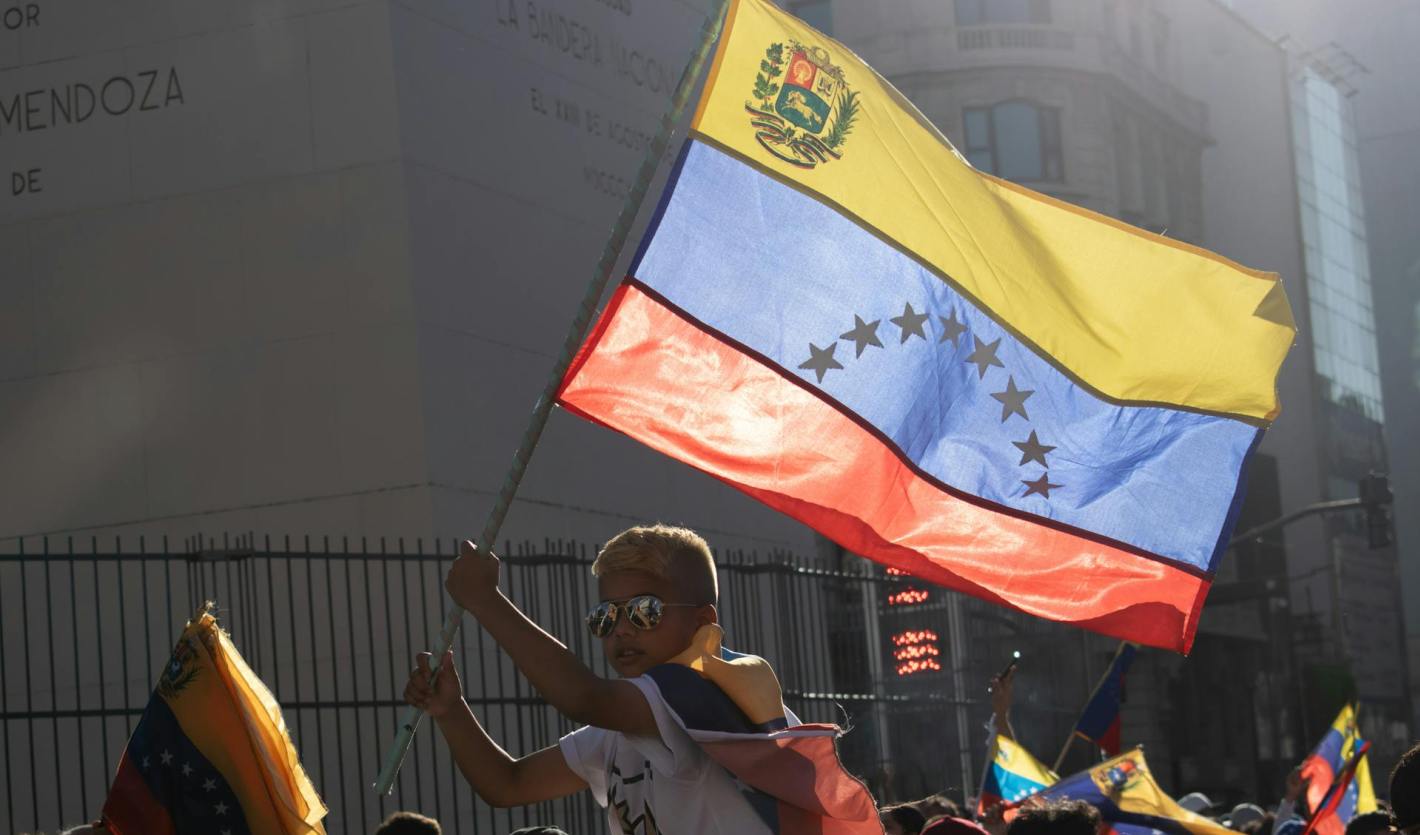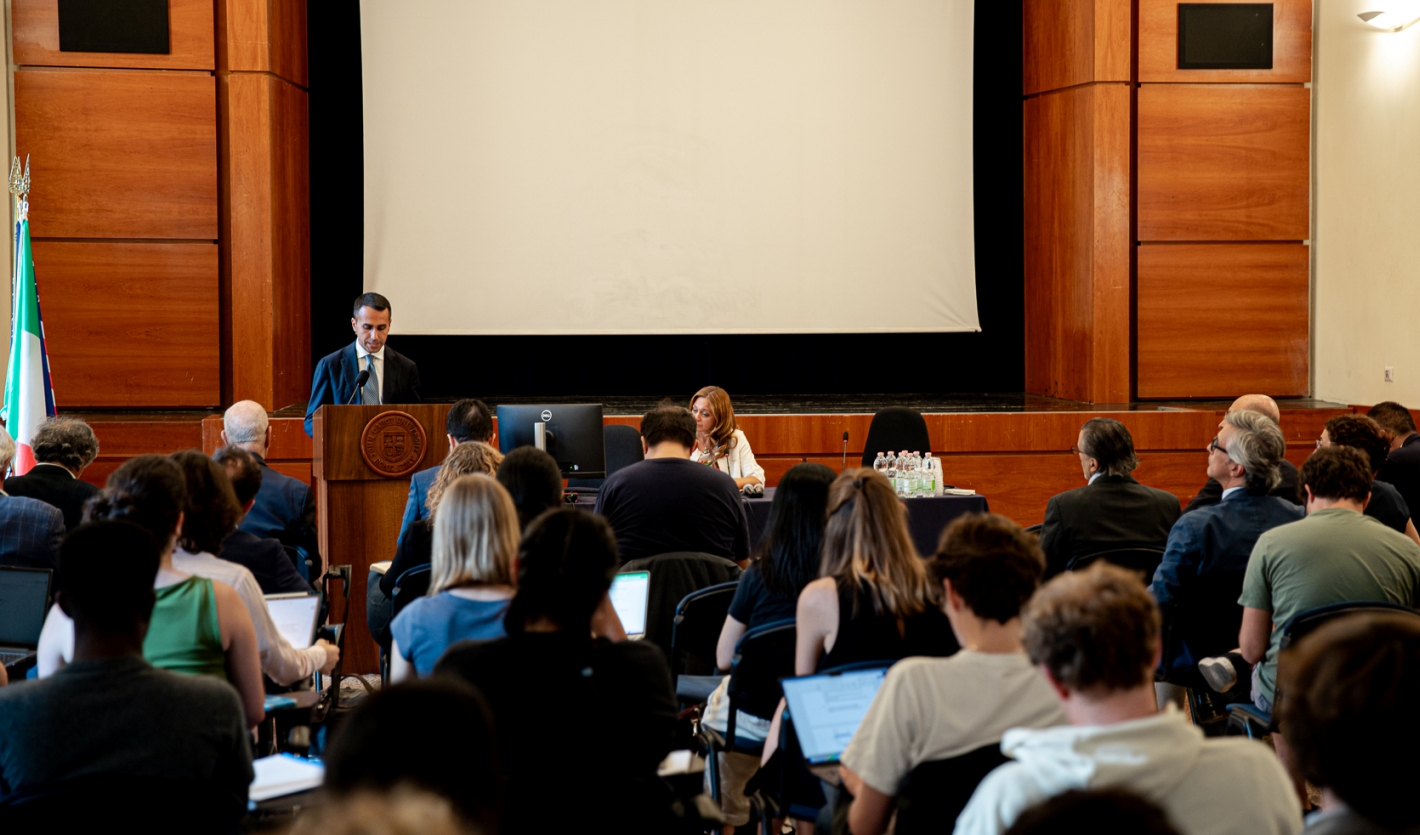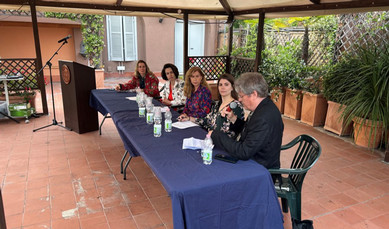The Guarini Institute for Public Affairs was established through the generosity of the Honorable Frank J. Guarini, John Cabot University Trustee. The Institute offers an annual series of lectures, seminars, and encounters aimed at enhancing knowledge and understanding of the key issues and challenges facing the world today, in particular those affecting the United States and Europe.
Director: Federigo Argentieri, Ph.D.
Associate Director: Enrico Fardella
Coordinator: Jacqueline Falk Maggi
The Senior Fellowship on Transatlantic Relations was created to host an annual Ambassador in residence at JCU and to promote transatlantic dialogue between the United States, Italy and Europe.
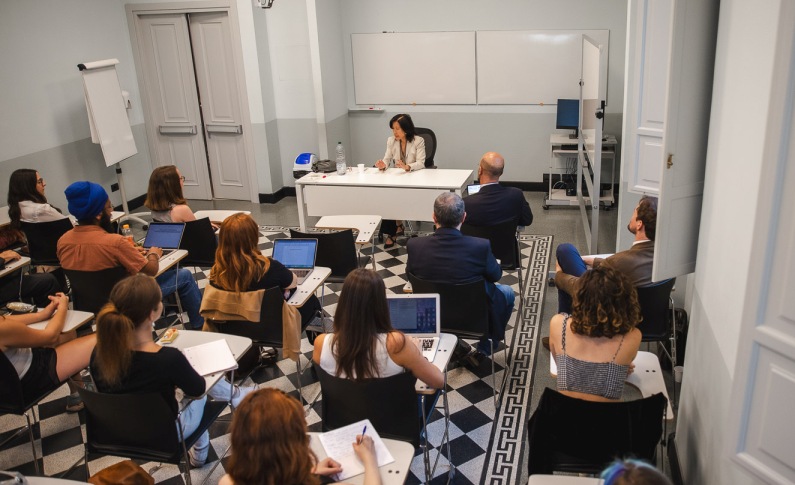
Doaa Abdel-Motaal holds a B.A. from Swarthmore College, an M.Sc. in Environment and Development studies from the University of Cambridge (UK) and a doctorate in Development studies from the University of Geneva. She is a former chief of staff of the UN International Fund for Agricultural Development (IFAD) and deputy chief of staff of the World Trade Organization. An environment and climate change expert, she traveled through the Antarctic and the Arctic and published the book Antartica: The Battle for the Seventh Continent (Praeger, 2016).
Eduardo Albrecht, JCU class of 1999, is a political anthropologist with a history of work across government, non-profit, and multilateral organizations. His research focuses on uses of AI in public decision-making processes. Currently he is a senior fellow at the United Nations University. In the past he was fellow at the European Institute for Asian Studies (EIAS) and the International Peace Institute (IPI). Since receiving his Ph.D. from SOAS in London he has published a wide variety of academic and policy publications. Albrecht has also been teaching at Pukyong National University, John Cabot University, Mercy University, City University of New York (CUNY), and Columbia University's SIPA.
Federigo Argentieri, Director of the Institute, studied politics, history and languages at the Universities of Rome "La Sapienza", Budapest-ELTE, and Harvard. He has widely published on the contemporary history and politics of Central-Eastern Europe and Italy, particularly on the Hungarian Revolution of 1956 and its Western echoes and effects, as well as on Ukraine. He teaches courses on international security and comparative politics of Europe, Latin America and developing countries and regularly contributes to Italy's main newspaper Corriere della Sera and to other Italian and international media.
Angelo Baccelloni is Assistant Professor of Marketing in the Department of Business Administration at John Cabot University. He earned his doctoral degree in Marketing from Sapienza University of Rome. He has completed postgraduate experiences at the University of Michigan, the University of Cambridge, the University of Oxford, Erasmus University Rotterdam, the University of St Gallen, and regularly collaborates on strategic projects with leading multinational organizations across different industries.
Angela Brintlinger has a Ph.D. in Slavic Languages and Literatures from the University of Wisconsin/Madison and is Chair of the Department of Slavic and East European Languages and Cultures, Director of the Center for Slavic, East European and Eurasian Studies, and Professor of Slavic Studies at Ohio State University. She writes primarily about Russian literature, culture, and film, and has expertise in biography, war, emigre culture, food studies, and translation. She held the Fulbright Distinguished Chair of Slavic at Warsaw University and regularly leads student tours across Central and Eastern Europe.
Michael Driessen is Associate Professor of Political Science and International Affairs and Director of the M.A. program in International Affairs at John Cabot University. He also directs the Rome Summer Seminars on Religion and Global Politics. He received his doctorate from the University of Notre Dame and has been a post-doctoral fellow at Georgetown University's School of Foreign Service in Doha, Qatar as well as a Jean Monnet Fellow at the European University. Driessen’s books include The Global Politics of Interreligious Dialogue (Oxford, 2023), Human Fraternity and Inclusive Citizenship: Interreligious Engagement in the Mediterranean (ISPI, 2021; co-edited with Fabio Petito and Fadi Daou), and Religion and Democratization (Oxford, 2014).
John Fanti has a Master's in Engineering Economic Systems from Stanford University and an undergraduate degree from Polytechnic Institute of New York. He started his career at AT&T’s Bell Laboratories in NJ. He opened AT&T's first office in Italy in 1990 and became AT&T's Regional Managing Director for Southern Europe and then, in 2000, started his own telecom company, Telefant Srl. He has been Vice President and member of the Board of Directors of the American Chamber of Commerce in Italy since 1994.
Enrico Maria Fardella, Associate Director of the Institute, is Global Fellow of the Woodrow Wilson International Center for Scholars in Washington D.C. and sits on the editorial board of Orizzonte Cina quarterly journal. His fields of interests are: the history of Chinese foreign policy; China relations with the US, Europe and the Middle East from the Cold War to the present. He is a Visiting Professor at JCU and Associate Professor at the Department of Social and Human Sciences of the University of Naples ‘L’Orientale,’ as well as Director of the ChinaMed.it project, a research platform that looks at China’s role in the wider Mediterranean region.
Patrizia Feletig graduated in Economics and Business Finance from LUISS in Rome. She has worked in financial institutions, communications groups, in the energy sector such as the national electrical utility association, EV sharing, and nuclear decommissioning. She has published books on renewable energy, nuclear, carbon captures technologies and environmental issues. She is a member of Fondazione Luigi Einaudi Scientific Committee. She is Chairwoman of Associazione Copernicani a non-profit, independent, cross-party, advocacy group on innovation and digital issues.
Costanza Hermanin is a research fellow at the European University Institute in Florence and a visiting professor at the College of Europe in Bruges and SciencesPo Paris. She is a political activist and media commentator as well as the President of EquALL, an NGO promoting inclusiveness and parity in politics. Her research and teaching focus on politics and policy of the European Union, especially in the areas of decision-making, equality budgeting, migration, justice and non-discrimination. She has worked in the cabinet of Italy’s Minister of Justice, and held positions within the European Commission, the French Ministry of Foreign Affairs, and the Open Society Foundations in Brussels.
The International Relations Society is a student-based club that seeks to examine the current international politics dynamics through formal and informal academic discussions. Among their most regular meetings are the recurring Politics sessions in which students delve deeper into contemporary international challenges and discuss them in an informal setting, as well as the hosting of guest lecturers during which distinguished scholars share their insights with club members. The IR Society takes advantage of the multicultural backgrounds and the multidisciplinary abilities of John Cabot’s students to enrich its conversations and seeks to create a respectful environment in which its members can enhance their own thinking by discussing with their peers.
Viviana Mazza is the U.S. Correspondent for the Italian newspaper Corriere della Sera. She covers U.S. national and international politics, as well as culture and society. She has a M.Sc. in Journalism from Columbia University and a degree in International Law and Refugee Studies from the American University of Cairo and is a Fulbright alumna, a German Marshall Fund fellow and a Young Leader at the Council for the United States and Italy. In 2010 she was awarded the ‘Luchetta Prize’ and the ‘Amerigo Prize’ for journalism, and in 2020 the ‘Biagio Agnes’ prize. She authored several books, including The Girls of Revolution Street (published in Italy in March 2019), a collection of stories about women she met over the last thirteen years in Syria, Iran, Saudi Arabia, Egypt, Afghanistan and Pakistan.
Roberto Menotti is Editor-in-chief of Aspenia online, Deputy Editor of Aspenia, and Senior Advisor, International Activities, at Aspen Institute Italia, in Rome. He is a member of the Scientific Board of the NATO Defense College Foundation (since 2018). He has published in specialized journals (including Survival, Europe’s World, Turkish Policy Quarterly, Journal of International Relations and Development, Middle East Quarterly) as well as edited volumes, and is author of four books (in Italian) on international affairs and security issues (Guerini 1999, Laterza 2003 and 2010, Rubbettino 2021).
Hans Noel is Associate Professor of Government at Georgetown University. His research is on political coalitions, political parties and ideology, with a focus on the United States. He is the author of Political Ideologies and Political Parties in America, and a co-author of The Party Decides: Presidential Nominations Before and After Reform and of Political Parties. His work has appeared in the American Political Science Review, the Journal of Politics and Perspectives on Politics, among other journals. He received his Ph.D. from UCLA in 2006.
Barbara Ottaviani Jones is a Film and Media studies scholar, with a specialization in Linguistics. She received her M.A. from the Department of Communication (D.A.M.S.) at the University of Roma TRE and her Ph.D. from Middlebury College, VT. A former Post-Doctoral Researcher at Arizona State University for the Italian and French department, her research interests include literature, philosophy, sociology, and comparative cinema. She also has a range of varied work experiences including Study Abroad Director, International Student Academic Advisor, Co-Founder of a Film Society, Cyber Fraud Security, and Advance Health Care Planning Facilitator.
Bogdan Popescu is an Assistant Professor at John Cabot University. His research is on historical political economy, focusing on state management in peripheral regions and their enduring ramifications in Europe. He is the author of Imperial Borderlands (Cambridge University Press, 2023). His work has appeared in the Comparative Political Studies, Quarterly Journal of Political Science, and Journal of Conflict Resolution, among other journals. He received his Ph.D. from the University of Chicago in 2018. Previously, he held fellowships at Princeton, Oxford, and Bocconi Universities.
Amy K. Rosenthal, JCU class of 1995, holds an M.Sc. in Comparative Politics from LSE and a Ph.D. in Contemporary European History from Queen Mary, University of London. She has taught at various American university programs in Rome and has been a visiting lecturer at the Goldstein-Goren Department of Jewish Thought, Ben-Gurion University of the Negev. As a journalist, she has worked for ABC News and has written extensively on Israeli, Italian and U.S. politics, economics, history, and culture. She currently works as a translator and writes for numerous publications, including The Times of Israel and ParkTime Magazine.
Silvia Scarpa is Chair of the Department of Political Science and International Affairs and Professor of International Relations at John Cabot University. She has been teaching at JCU since 2009. She is also a Visiting Research Fellow in International Law and Modern Slavery at the British Institute of International and Comparative Law (BIICL). Professor Scarpa teaches courses on contemporary slavery and human trafficking, international law, international organizations, European Union law, human rights, and international migration.
Pratishtha Singh holds a Ph.D. in Italian literature from the University of Delhi. Her previous degrees are from the Department of Germanic and Romance Studies and the School of Language in the University of Delhi and Jawaharlal Nehru University respectively. Having taught Italian literature in India for several years, she is currently actively involved in politics in the country. She contributes regularly to leading dailies in India and has written books on various subjects including poetry, politics, and didactics. Her articles and essays have been published in journals and books across the world, especially in India and Italy.
Andrew Spannaus is a journalist and political analyst, known for his early analysis of the populist revolt across the West with his books on Donald Trump and European protest movements. He is the founder of the newsletter Transatlantico.info, contributes to Aspenia and numerous other publications, and provides commentary on American politics for Rai News 24, Radio24 and RSI (Swiss Broadcasting Corporation). In March 2002, he was elected to his second term as Chairman of the Milan Foreign Press Association, a position he also held from 2018 to 2020. He lectures on US economic history in the Master's program in International Economics and Politics at ASERI, Catholic University of Milan.
Nicholas Startin, Ph.D., is an Associate Professor in International Relations at John Cabot University and Interim Dean of Academic Affairs. His research focuses primarily on the Radical Right in Europe and on Euroscepticism and opposition to the EU. He has co-edited two highly cited 'open competition' special issues in the field, as well as The Routledge Handbook of Euroscepticism. He is a non-resident Senior Fellow of the Brussels- based Global Governance Institute, the former Chair of the University Association of Contemporary European Studies (UACES) and was formerly Head of Politics, Languages and International Studies (PoLIS) at the University of Bath. He has experience of working with EU policymakers and stakeholders and an established media profile both in the UK and in France.
The Student Government of John Cabot University represents the voice of the students. Student Government works to uphold the interests of the students and to incentivize cooperation between them and faculty and staff. Additionally, it aims to provide an opportunity to express possible concerns and hear the community on suggestions or opinions. The purpose of Student Government is two-fold, as it seeks to engage the community with events but also delves into hearing the concerns of the students in order to bring the values of excellence and responsibility to life.
Eric R. Terzuolo holds doctorates in History from Stanford University and in Higher Education Administration from The George Washington University. He is the author of numerous publications on the proliferation of weapons of mass destruction, arms control, transatlantic relations, the history and geopolitics of Italy, the Balkans and East Central Europe, and on international education. A former US Foreign Service officer (1982-2003) and professor at various universities in Europe (2003-2010), he also chaired the Western Europe Advanced Area Studies course at the Foreign Service Institute (US Department of State) and has taught at the American University School of International Service and at The George Washington University.
Simone Tholens is Associate Professor of International Relations at John Cabot University, and part-time professor at the European University Institute/Robert Schuman Centre. Her main research interest are interventions, security assistance, bordering processes, and materiality of global war practices. After graduating with a Ph.D. in International Relations at the European University Institute (2012), she was a Research Fellow at the EUI, before taking up a post as Senior Lecturer at Cardiff University (2016-2021), where she co-founded and served as Director of the Centre for Conflict, Security and Societies. She has also taught at Johns Hopkins University SAIS Europe and held the UK Leverhulme Trust’s International Academic Fellowship (2020-2021).
The United Nations
Food and Agriculture Organization
International Fund for Agricultural Development
World Food Programme
Organization of American States
NATO
Council of Europe
African Union
Association of Southeast Asian Nations
Asia-Pacific Economic Cooperation
Organization for Economic Co-operation and Development
The Organization for Security and Co-operation in Europe
Andean Community
European Parliament
European People's Party
Party of European Socialists
European Commission
UK Prime Minister
White House
US Department of State
US Department of Defense
President of Russia
Deutsche Welle
Italian Ministry of Foreign Affairs
Italian Chamber of Deputies
Pew Research Center
Istituto Affari Internazionali
European Union Institute for Security Studies
Council on Foreign Relations
International Institute for Strategic Studies
International Security Forum
Transatlantic Institute
Stockholm International Peace Research Institute
Chatham House
Canadian International CouncilL'Occidentale
ISPI
European Navigator
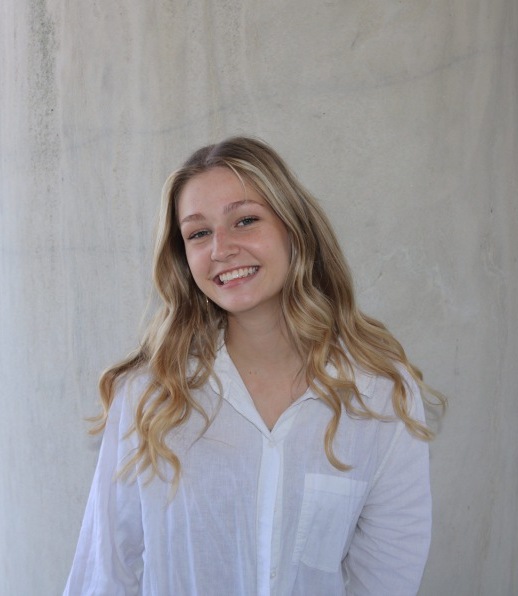
The Guarini Institute for Public Affairs offers an internship every semester to a JCU student, irrespective of major or minor, with a keen interest in public affairs, a GPA above 3.2 and a strong motivation for the job. The internship can be for-credit or not for-credit. Applications, with a cv and cover letter, must be submitted to Professor Argentieri, director of the Institute, by July 31st for the Fall semester, by November 30th for the Spring semester, and by May 10th for Summer term.
Tasks to be implemented by the intern include, among others:
Marco Rampoldi, Study Abroad student, Spring & Summer 2020
As a study abroad student from McGill University I took the opportunity to work for the Guarini Institute for Public affairs as a way to refine my professional skills and expand my network. This experience was as challenging as it was rewarding. The work I did for the institute sharpened my administrative and organizational abilities and in turn led me to become a more dynamic and flexible problem solver. Moreover, I had the pleasure to work alongside a vast array of policy experts, academics, entrepreneurs and journalists and have consequently gained a much clearer understanding of the professional pathways available to me.
What I appreciated the most out of this work experience was the feeling that what I was doing mattered. I believe in the importance of divulging the remarkable stories, worldviews and theories that were presented during the events hosted by the Guarini Institute. I take great satisfaction in knowing that I worked for an institute that provided a platform for these ideas to be shared.
Kamila Sabyrrakhim, Class of 2019
Like most graduates, I was overwhelmed with a feeling of uncertainty after graduation, not knowing what to do next. Once I found out about the Guarini Institute internship opportunity, I did not hesitate to apply. The program enabled me to immerse myself into the world of international politics and helped me to shape my academic and professional interests.
Moreover, through the Guarini Institute internship I was able to improve my organizational skills, which made me realize that every successful event requires thorough preparation. Having the opportunity to represent the Guarini Institute on international conferences such as OSCE’s Inter-Regional Conference on Anti-terrorism in Mongolia and attending other events enabled me to expand my professional network, and deepen my knowledge in the field of international affairs. Finally, the Institute director, Professor Federigo Argentieri, has tremendously added to my personal and academic development, by challenging me to step out of my comfort zone and giving me valuable practical advice along the way.
Sopho Kharazi, Class of 2018
Even though the internship in the Guarini Institute for Public Affairs was not my first job experience, it was the first one involving event planning, organization and logistics. Through this experience, I have developed my professional and academic qualifications. On the one hand, as an intern, I have improved my communication, writing, public speaking, time management and organizational skills. On the other hand, as I was obliged to attend various seminars organized by the Institute, I have enriched my knowledge of issues related to the international relations.
This internship experience has allowed me to meet numerous interesting people and expand my contact network. I have received various pieces of advice regarding my career path from professionals who are the best in their fields. My supervisor, Professor Federigo Argentieri was very helpful as he contributed tremendously to my professional and academic growth.
Cristian Tracci, Class of 2016
I have always loved running around school trying to organize all kinds of events. At the same time, I am a political junkie. The internship with the Guarini Institute has allowed me to further develop these two components of my character.
I have maintained public relations with other institutions, for example by representing the Guarini Institute at the conference on the Radical Left in Central and Eastern Europe, in Brussels. Our academic lectures have fostered public discussions with several eminent guests, whom I had the pleasure of meeting. Finally, Prof. Argentieri has acted more as a mentor than a supervisor, often sharing precious advice and knowledge.
Max Harden, Study Abroad student, Spring 2012
As my first internship related to world affairs and academic lectures, my experience interning for the Guarini Institute has been invaluable in exposing me to world issues and areas of study that I previously had little to no interest in. Having now been involved in organizing lecture events, I believe that I now have a much greater interest in attending them and a greater appreciation for academic conferences in general.
I would say that possible applicants should have a general interest in world affairs and becoming educated on topics that may be outside of their focus of study. This internship has certainly strengthened my organizational and communication skills, and I highly recommend applying to both degree-seeking and study abroad students alike.
Anthony Vanicek, Class of 2013
Being an intern at the Guarini Institute for Public Affairs not only gave me work experience, but it forced me to re-evaluate my perspectives on critical issues facing Europe and the United States.
Hearing the voices of men and women regarding prevalent concerns in the world, meeting and keeping correspondence with journalists, diplomats, ambassadors, scholars and writers gave me an opportunity to learn in a unique way that a classroom is seldom able to offer.
Marianna Griffini, Study Abroad student, Summer Session I 2010
I am an International Affairs major at the George Washington University (Class of 2013) and, eager to undertake a new and dynamic educational experience, I decided to apply for this internship.
You should be endowed with an interest in International Affairs and History and with good organizational skills. I carried out basic logistic tasks (updating the Guarini Institute mailing list, sending out invitations, and writing the reports of the events we hosted), but, at the same time, I had the opportunity of strengthening such skills.
The events hosted by the Guarini Institute are all remarkable for their political and historical relevance; I especially appreciated Dr. Esther Brimmer's discussion about the global challenges the world is facing nowadays. It was involving to attend a lecture given by the Assistant Secretary of State for International Organizations. I strongly recommend applying for the internship at the Guarini Institute if you are interested in organizing and attending great events!
Ottavia Criss, Class of 2009
My first experience in communication, event planning, and logistics was through my internship with the Guarini Institute for Public Affairs. I not only learned about global current events from the lectures, but I also learned how to communicate on a professional level and carry out different tasks from start to finish in cooperation with other coworkers around the university. I also learned how valuable and essential it is to have the knowledge and capability to perform logistical tasks and event planning.
My internship experience also helped me in my future career. Since working for the Guarini Institute, I have completed communication and event planning projects for the World Bank, UN, and other organizations.
J. Cottingham (Spring 2024)
H. Nowak (Fall 2023)
G. Romano (Spring 2023)
R. Halterman (Fall 2021 & Spring 2022)
M. Rampoldi (Spring & Summer 2020)
K. Sabyrrakhim (Summer & Fall 2019)
D. Brobbey Kyei (Spring 2019)
C. Casciola (Fall 2018)
G. Rossi (Summer 2018)
S. Kharazi (Spring 2018)
F. Tripodi (Fall 2017)
F. Loner (Student Assistant - Spring 2017)
N. Biles (Spring 2017)
C. Tracci (Summer 2016)
R. Issa (Spring 2016)
R. Sciarra (Fall 2015)
A. Farrage (Summer 2015)
M. Cannata (Summer 2015)
K. Young (Spring 2015)
M. Liburdi (Spring 2015)
M. Barbasàn Ballotta (Fall 2014)
M. Dentamaro (Summer 2014)
F. Leone (Spring 2014)
Z. Sherburne (Spring 2014)
U. Davis (Fall 2013)
T. Trillò (Fall 2013)
I. Mancheva (Summer 2013)
A. Schaaf (Spring 2013)
R. Oudemans (Fall 2012)
I. Giurelli (Summer 2012)
M. Harden (Spring 2012)
E. Swanson (Fall 2011)
A. Vanicek (Summer 2011)
R.Vitalone (Spring 2011)
H. Wolkwitz (Fall 2010)
M. Griffini (Summer 2010)
T. Hormby (Spring 2010)
E. Polich (Fall 2009)
S. Cavasola (Spring 2009)
H. Lapatova (Fall 2008)
O. Criss (Spring 2008)
K. Mapes (Fall 2007)

